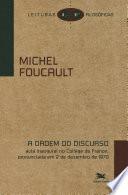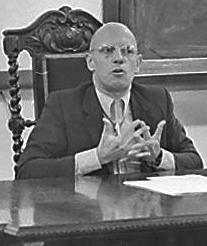Obras

A Ordem do Discurso
Michel FoucaultVigiar e Punir
Michel FoucaultAs palavras e as coisas
Michel FoucaultMichel Foucault Frases famosas
A Ordem do Discurso, p.44"
A Ordem do Discurso
“Édipo não se cegou por culpa, mas por excesso de informação.”
Œdipe ne s'est pas crevé les yeux par culpabilité, mais par excès d'information
citado em reportagem de " Le Monde http://www.mre.gov.br/portugues/noticiario/internacional/selecao_detalhe3.asp?ID_RESENHA=152810", intitulada "Lula était le "sauveur du peuple", il ne l'est plus : le blues des intellectuels et des artistes face aux scandales", Data: 30/07/2005
“As luzes que descobriram as liberdades inventaram também as disciplinas”
na obra "Vigiar e Punir", página 183, de Michel Foucault, Editora Vozes, 1998; citado em "Modernidade e Dominação" - página 105, de Sílvio Cesar Camargo, Publicado por Annablume
Frases sobre o tempo de Michel Foucault
...
FOUCAULT, M. As Palavras e as Coisas. São Paulo, Martins Fontes: p. 9-12.
The Order of Things: An Archaeology of the Human Sciences
Citações de idade de Michel Foucault
La fiction consiste donc non pas à faire voir l'invisible, mais à faire voir combien est invisible l'invisibilité du visible
citado em "Qu'est-ce qu'un espace littéraire?" - Página 31, de Xavier Garnier, Pierre Zoberman, Pascale Hellégouarc'h, Maarten Van Delden - Publicado por Presses universitaires de Vincennes, 2006 ISBN 2842921852, 9782842921859 - 206 páginas
“Os problemas da loucura giram ao redor da materialidade da alma.”
Michel Foucault, início do Cap. 7 de A história da loucura na Idade Clássica.
“Pois toda felicidade não é mais, talvez, que felicidade de expressão.”
citado em "A refração da sombra" - Página vii, de Paulo Cesar Lopes - Publicado por FUNPEC Editora, 2004 ISBN 8587528777, 9788587528773 - 113 páginas
Michel Foucault frases e citações
"Maladie Mentale et Psychologie"
“O novo não está no que é dito, mas no acontecimento de sua volta.”
A Ordem do Discurso, p.26"
A Ordem do Discurso
História da Sexualidade 2
Microfísica del poder
Microfísica del poder
A Ordem do Discurso, p.42"
A Ordem do Discurso
“Chamamos de loucura essa doença dos órgãos do cérebro…”
Voltaire - Dicionário Filosófico In: Michel Foucault, início do Cap. 7 de A história da loucura na Idade Clássica.
Microfísica del poder
No momento em que a dúvida atingia seus perigos maiores, Descartes tinha consciência de que não podia estar louco – sem que isso impedisse que reconhecesse, durante muito tempo ainda e até o mau gênio, que todos os poderes do desatino espreitavam à volta do seu pensamento.(...)"
Michel Foucault, início da Introdução da Parte III de História da loucura na Idade Clássica.
Michel Foucault: Frases em inglês

“Maybe the target nowadays is not to discover what we are but to refuse what we are.”
Fonte: "The Subject and Power" (1982), p. 785
“Where there is power, there is resistance.”
Fonte: The History of Sexuality, Volume 1: An Introduction
Fonte: Anti-Oedipus: Capitalism and Schizophrenia
Fonte: The Birth of the Clinic: An Archaeology of Medical Perception
Truth, Power, Self : An Interview with Michel Foucault (25 October 1982)
Fonte: Discipline and Punish (1977), Chapter Three, The Gentle Way in Punishment
Contexto: This, then, is how one must imagine the punitive city. At the crossroads, in the gardens, at the side of roads being repaired or bridges built, in workshops open to all, in the depths of mines that may be visited, will be hundreds of tiny theatres of punishment. Each crime will have its law; each criminal his punishment. It will be a visible punishment, a punishment that tells all, that explains, justifies itself, convicts: placards, different-coloured caps bearing inscriptions, posters, symbols, texts read or printed, tirelessly repeat the code. Scenery, perspectives, optical effects, trompe-l’œil sometimes magnify the scene, making it more fearful than it is, but also clearer. From where the public is sitting, it is possible to believe in the existence of certain cruelties which, in fact, do not take place. But the essential point, in all these real or magnified severities, is that they should all, according to a strict economy, teach a lesson: that each punishment should be a fable. And that, in counterpoint with all the direct examples of virtue, one may at each moment encounter, as a living spectacle, the misfortunes of vice. Around each of these moral ‘representations’, schoolchildren will gather with their masters and adults will learn what lessons to teach their offspring. The great terrifying ritual of the public execution gives way, day after day, street after street, to this serious theatre, with its multifarious and persuasive scenes. And popular memory will reproduce in rumour the austere discourse of the law. But perhaps it will be necessary, above these innumerable spectacles and narratives, to place the major sign of punishment for the most terrible of crimes: the keystone of the penal edifice.
Discipline and Punish (1977)
Fonte: Discipline and Punish: The Birth of the Prison
Fonte: The History of Sexuality, Volume 1: An Introduction
Fonte: The Archaeology of Knowledge & The Discourse on Language
“The soul is the effect and instrument of a political anatomy; the soul is the prison of the body”
Discipline and Punish (1977)
Contexto: The man described for us, whom we are invited to free, is already in himself the effect of a subjection much more profound than himself. A 'soul' inhabits him and brings him to existence... the soul is the effect and instrument of political anatomy; the soul is the prison of the body.
Contexto: But let there be no misunderstanding: it is not that a real man, the object of knowledge, philosophical reflection or technological intervention, has been substituted for the soul, the illusion of theologians. The man described for us, whom we are invited to free, is already in himself the effect of a subjection more profound than himself. A 'soul' inhabits him and brings him to existence, which is itself a factor in the mastery that power exercises over the body. The soul is the effect and instrument of a political anatomy; the soul is the prison of the body.
“Knowledge is not for knowing: knowledge is for cutting.”
Variante: Knowledge is not made for understanding; it is made for cutting.
Fonte: The Foucault Reader: An Introduction to Foucault's Thought
“The 'Enlightenment', which discovered the liberties, also invented the disciplines.”
Discipline and Punish (1977)
Fonte: Discipline and Punish: The Birth of the Prison
The Archaeology of Knowledge (1972), tr. A. M. Sheridan Smith (New York: Pantheon)
Fonte: The History of Sexuality, Volume 1: An Introduction
Fonte: Madness and Civilization: A History of Insanity in the Age of Reason
Fonte: Discipline and Punish (1977), Chapter Two, Generalized Punishment, pp.87
Contexto: It proved necessary, therefore, to control these illicit practices and introduce new legislation to cover them. The offenses had to be properly defined and more surely punished; out of this mass of irregularities, sometimes tolerated and sometimes punished with a severity out of all proportion to the offense, one had to determine what was an intolerable offense, and the offenders had to be apprehended and punished. With the new forms of capital accumulation, new relations of production and the new legal status of property, all the popular practices that belonged, either in a silent, everyday, tolerated form, or in a violent form, to the illegality of rights were reduced by force to an illegality of property. In that movement which transformed a society of juridico-political levies into a society of the appropriation of the means and products of labour, theft tended to become the first of the great loopholes in legality. Or, to put it another way, the economy of illegalities was restructured with the development of capitalist society. The illegality of property was separated from the illegality of rights. This distinction represents a class opposition because, on the one hand, the illegality that was to be most accessible to the lower classes was that of property – the violent transfer of ownership – and because, on the other, the bourgeoisie was to reserve to itself the illegality of rights: the possibility of getting round its own regulations and its own laws, of ensuring for itself an immense sector of economic circulation by a skillful manipulation of gaps in the law – gaps that were foreseen by its silences, or opened up by de facto tolerance. And this great redistribution of illegalities was even to be expressed through a specialization of the legal circuits: for illegalities of property – for theft – there were the ordinary courts and punishments; for the illegalities of rights – fraud, tax evasion, irregular commercial operations – special legal institutions applied with transactions, accommodations, reduced fines, etc. The bourgeoisie reserved to itself the fruitful domain of the illegality of rights. And at the same time as this split was taking place, there emerged the need for a constant policing concerned essentially with this illegality of property. It became necessary to get rid of the old economy of the power to punish, based on the principles of the confused and inadequate multiplicity of authorities, the distribution and concentration of the power correlative with actual inertia and inevitable tolerance, punishments that were spectacular in their manifestations and haphazard in their application. It became necessary to define a strategy and techniques of punishment in which an economy of continuity and permanence would replace that of expenditure and excess. In short, penal reform was born at the point of junction between the struggle against the super-power of the sovereign and that against the infra-power of acquired and tolerated illegalities.
“The soul is the prison of the body.”
[L]'âme, prison du corps.
Discipline and Punish (1977) as translated by Alan Sheridan, p. 30
Discipline and Punish (1977)
Fonte: Discipline and Punish (1977), Chapter Two, Generalized Punishment, pp. 101
Fonte: Discipline and Punish (1977), Chapter One, The body of the condemned, pp. 24
Contexto: We must first rid ourselves of the illusion that penality is above all (if not exclusively) a means of reducing crime and that, in this role, according to the social forms, the political systems or beliefs, it may be severe or lenient, tend towards expiation of obtaining redress, towards the pursuit of individuals or the attribution of collective responsibility. We must analyse rather the ‘concrete systems of punishment’, study them as social phenomena that cannot be accounted for by the juridical structure of society alone, nor by its fundamental ethical choices; we must situate them in their field of operation, in which the punishment of crime is not the sole element; we must show that punitive measures are not simply ‘negative’ mechanisms that make it possible to repress, to prevent, to exclude, to eliminate; but that they are linked to a whole series of positive and useful effects which it is their task to support (and, in this sense, although legal punishment is carried out in order to punish offences, one might say that the definition of offences and their prosecution are carried out in turn in order to maintain the punitive mechanisms and their functions).
Part One: 1. Stultifera Navis
History of Madness (1961)
Contexto: From the knowledge of that fatal necessity that reduces man to dust we pass to a contemptuous contemplation of the nothingness that is life itself. The fear before the absolute limit of death becomes interiorised in a continual process of ironisation. Fear was disarmed in advance, made derisory by being tamed and rendered banal, and constantly paraded in the spectacle of life. Suddenly, it was there to be discerned in the mannerisms, failings and vices of normal people. Death as the destruction of all things no longer had meaning when life was revealed to be a fatuous sequence of empty words, the hollow jingle of a jester’s cap and bells. The death’s head showed itself to be a vessel already empty, for madness was the being-already-there of death. Death’s conquered presence, sketched out in these everyday signs, showed not only that its reign had already begun, but also that its prize was a meagre one. Death unmasked the mask of life, and nothing more: to show the skull beneath the skin it had no need to remove beauty or truth, but merely to remove the plaster or the tawdry clothes. The carnival mask and the cadaver share the same fixed smile. But the laugh of madness is an anticipation of the rictus grin of death, and the fool, that harbinger of the macabre, draws death’s sting.
“Unreason is to reason as dazzlement is to daylight.”
Part Two: 2. The Transcendence of Delirium
History of Madness (1961)
Contexto: To say that madness is dazzlement is to say that the madman sees the day, the same day that rational men see, as both live in the same light, but that when looking at that very light, nothing else and nothing in it, he sees it as nothing but emptiness, night and nothingness. Darkness for him is another way of seeing the day. Which means that in looking at the night and the nothingness of the night, he does not see at all. And that in the belief that he sees, he allows the fantasies of his imagination and the people of his nights to come to him as realities. For that reason, delirium and dazzlement exist in a relation that is the essence of madness, just as truth and clarity, in their fundamental relation, are constitutive of classical reason.
In that sense, the Cartesian progression of doubt is clearly the great exorcism of madness. Descartes closes his eyes and ears the better to see the true light of the essential day, thereby ensuring that he will not suffer the dazzlement of the mad, who open their eyes and only see night, and not seeing at all, believe that they see things when they imagine them. In the uniform clarity of his closed senses, Descartes has broken with all possible fascination, and if he sees, he knows he really sees what he is seeing. Whereas in the madman’s gaze, drunk on the light that is night, images rise up and multiply, beyond any possible self-criticism, since the madman sees them, but irremediably separated from being, since the madman sees nothing.
Unreason is to reason as dazzlement is to daylight.
Part One: 1. Stultifera Navis
History of Madness (1961)
Contexto: Meaning created links so numerous, so rich and involved that only esoteric knowledge could possibly have the necessary key. Objects became so weighed down with attributes, connections and associations that they lost their own original face. Meaning was no longer read in an immediate perception, and accordingly objects ceased to speak directly: between the knowledge that animated the figures of objects and the forms they were transformed into, a divide began to appear, opening the way for a symbolism more often associated with the world of dreams.
Part One: 1. Stultifera Navis
History of Madness (1961)
Contexto: Water and navigation had that role to play. Locked in the ship from which he could not escape, the madman was handed over to the thousand-armed river, to the sea where all paths cross, and the great uncertainty that surrounds all things. A prisoner in the midst of the ultimate freedom, on the most open road of all, chained solidly to the infinite crossroads. He is the Passenger par excellence, the prisoner of the passage. It is not known where he will land, and when he lands, he knows not whence he came. His truth and his home are the barren wasteland between two lands that can never be his own. […] One thing is certain: the link between water and madness is deeply rooted in the dream of the Western man.
